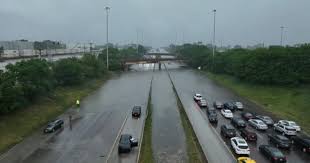Hurricane Milton and Tropical Storm Helene, two devastating storms that recently battered Florida and the southeastern United States, have sparked new concerns about the future of climate change and its effects across the country, including in places like Illinois that are far from the coast. While hurricanes have yet to make a direct hit on the Chicago area, recent weather events have shown that their remnants can still leave a significant mark on the region.
“We felt Helene in Illinois,” said Donald Wuebbles, a professor of Atmospheric Science at the University of Illinois at Urbana-Champaign. The storm, which devastated parts of the Southeast, brought heavy winds and rain to Central and Southern Illinois, with Chicago experiencing gusts of up to 40 mph. For Wuebbles, Helene’s unusual inland path is a reminder that even inland states are not immune to the impacts of tropical systems.
Climate experts point to human-caused climate change as the driving force behind these recent weather phenomena. Hurricane Milton, for example, became the fastest storm to intensify into a Category 5 hurricane in the Gulf of Mexico, an event that would have been far less likely without the influence of global warming, according to Climate Central. These rapidly intensifying storms pose a growing threat, not just along coastlines but farther inland as well.
“Hotter oceans and a warmer atmosphere mean more intense storms,” explained Steven Nesbitt, head of the Department of Climate, Meteorology, and Atmospheric Sciences (CliMAS) at the University of Illinois Urbana-Champaign. “The extra heat and water vapor give storms more energy, which can drive them further and with more intensity.”
While it’s unlikely that a full-blown hurricane would directly hit Chicago, remnants of tropical systems, as seen with Helene, can still affect the region. In 2008, for example, remnants of Hurricane Ike brought over 8.5 inches of rain to Chicago, causing widespread flooding and a state of emergency. Nesbitt and other experts warn that as storms carry more moisture due to global warming, the risk of inland flooding could increase significantly.
According to research from the Berkeley National Laboratory, Helene was 20 times more intense because of climate change. This kind of unpredictability and increased storm strength raises concerns for places that were once considered safe from such extreme weather events.
The effects of tropical storms don’t stop at flooding and wind damage. There are significant economic impacts that ripple through the supply chain, even reaching states like Illinois. For example, farmers in Central Illinois rely on phosphate shipments from Florida, a supply chain disrupted when Hurricane Helene struck. The resulting shortage and price spike have left some Illinois farmers scrambling ahead of the harvest season.
Hospitals have also been affected. Helene damaged a key production plant for IV fluids in North Carolina, leading to a nationwide shortage that has forced hospitals to postpone surgeries and other procedures.
“The economic consequences of these storms are enormous and growing,” said Robert Rauber, another climate expert from the University of Illinois. “Apart from climate change, we have population growth in vulnerable areas, which makes the situation worse. Rapidly intensifying storms give less time for preparation, leading to more damage.”
Illinois might not have to brace for direct hits from hurricanes, but experts still stress the importance of preparedness. The Illinois Emergency Management Agency (IEMA) recommends that residents maintain emergency supply kits with at least three days’ worth of essentials. Moreover, homeowners should document their belongings and familiarize themselves with the state’s Severe Weather Preparedness guide.
“Everyone needs to have a disaster plan, regardless of where they live,” Rauber emphasized. “We need to be proactive, not reactive, as the climate continues to change.”
At a community level, organizations like the Greater Chatham Initiative are partnering with scientists from Argonne National Laboratory to find ways to build weather-resilient communities. There is also an effort by Illinois’ Water Plan Task Force to mitigate flood damage, with a seven-year plan launched in 2022 aimed at improving infrastructure and protecting vulnerable areas.
While hurricanes may not be on the immediate radar for Illinois, the city does face its wind-related risks. According to a recent CBS News analysis, Chicago has a minor wind factor risk, with storms becoming more severe over the years. The city’s most significant wind event was an F4 tornado that occurred in 1967, causing massive damage. However, if a 1-in-3,000-year hurricane were to occur, it’s unlikely Chicago would experience its full force, though remnants could still bring severe weather.
The frequency and severity of storms like Milton and Helene remind us that climate change’s future effects may be hard to predict. While experts warn that the climate crisis will worsen, whether we can adapt quickly enough remains the key question. With rising temperatures making the oceans hotter, the possibility of stronger, more frequent storms continues to loom, and regions previously thought to be safe may find themselves at unexpected risk.
“Ultimately, we are heading into a different world than the one we’re in today,” Wuebbles said. “We have to be prepared for what that means.”
